Eurymachus Name Meaning & Details
Origin, Popularity, Numerology Analysis & Name Meaning of Eurymachus
Discover the origin, meaning, and cultural significance of the name EURYMACHUS. Delve into its historical roots and explore the lasting impact it has had on communities and traditions.
Name
Eurymachus
Gender
Male
Origin
Greek
Lucky Number
8
Meaning of the Name - Eurymachus
Eurymachus means 'wide fighter' or 'broad battle,' reflecting qualities of extensive combat prowess and strategic capability. The name suggests someone with widespread influence in conflict or leadership situations.
Eurymachus - Complete Numerology Analysis
Your Numerology Number
Based on Pythagorean Numerology System
Ruling Planet
Saturn
Positive Nature
Ambitious, efficient, realistic, and authoritative.
Negative Traits
Materialistic, stressed, confrontational, and can be overly ambitious.
Lucky Colours
Dark blue, black.
Lucky Days
Saturday.
Lucky Stones
Blue sapphire, amethyst.
Harmony Numbers
2, 4, 6.
Best Suited Professions
Business leaders, managers, financial services, law enforcement.
What People Like About You
Leadership, determination, organizational skills.
Famous People Named Eurymachus
Eurymachus
Mythological Suitor
Primary antagonist among Penelope's suitors in Homer's Odyssey
Eurymachus
Trojan Warrior
Son of Antenor who fought in the Trojan War
Eurymachus
Theban Noble
Mythological figure associated with Theban military campaigns
Name Variations & International Equivalents
Click on blue names to explore their detailed meanings. Gray names with will be available soon.
Cultural & Historical Significance
Extended Personality Analysis
The name Eurymachus suggests a personality marked by strategic intelligence, social grace, and ambitious drive, tempered by the cautionary legacy of its mythological namesake. Individuals with this name are often perceived as natural leaders with strong persuasive abilities and political acumen, capable of navigating complex social hierarchies. However, the mythological association also implies potential for arrogance, manipulative tendencies, and ethical flexibility when pursuing goals. The name carries an inherent tension between noble aspirations and the corrupting influence of power, suggesting someone who must consciously balance ambition with integrity. Modern interpretations might view Eurymachus as representing the sophisticated strategist who understands social dynamics thoroughly but must guard against the temptation to exploit them for personal gain.
Modern Usage & Popularity
Contemporary usage of Eurymachus is extremely limited, primarily confined to academic contexts, classical studies enthusiasts, and families with deep connections to Greek cultural heritage. The name's association with a negative character in one of Western literature's foundational texts has significantly hindered its adoption as a given name. In Greece itself, while mythological names remain popular, Eurymachus is overshadowed by more positively-connotated names from the same tradition. Its rarity makes it a distinctive choice that immediately signals classical education or particular interest in Greek mythology, though it requires considerable explanation in social contexts. The name occasionally appears in literary works, historical fiction, and academic discussions as a representative example of Greek mythological naming conventions.
Symbolic & Spiritual Meanings
Symbolically, Eurymachus represents the dangerous intersection of nobility, ambition, and moral compromise, serving as a timeless warning about the corrupting nature of unchecked privilege. The name embodies the classical Greek concept of hubris—excessive pride that challenges the gods and invites destruction. It symbolizes the aristocratic ideal perverted by selfish ambition, representing how inherited status without corresponding virtue leads to downfall. In a broader metaphorical sense, Eurymachus signifies the tension between traditional values and modern opportunism, the conflict between honorable conduct and pragmatic self-interest. The name also carries connotations of strategic warfare and political intelligence, reflecting the Greek ideal of the 'complete' noble warrior while simultaneously cautioning against the moral hazards of excessive cunning.

